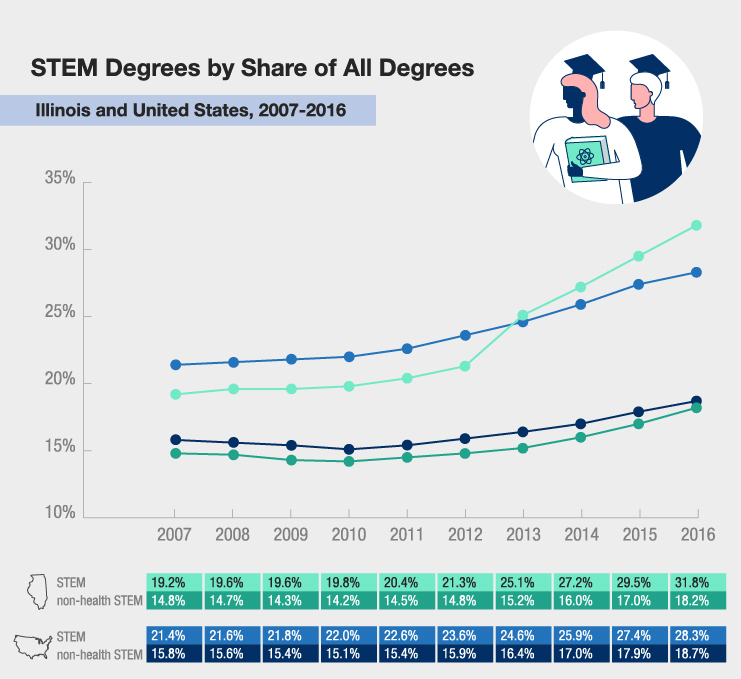By Andreas Cangellaris, Ph.D.
Dean of the College of Engineering and Incoming Provost
University of Illinois at Urbana-Champaign
Computer scientists and engineers have always been comfortable with disruption. Where others see a threat, we see a promise. Where others wonder what will become of the world, we define what the world can become. Think of it as confident optimism. We know the world changes, and we’re always ready to lead when it does.
Ubiquitous sensing, computing, and communication at almost instantaneous speeds, combined with remarkable advances in machine learning, are fueling the advancement of artificial intelligence (AI) as the next truly disruptive technology. Every industrial sector and every societal institution—the world the way we know it—will be affected by it over the next 25 years.
Computer scientists and engineers will be in the center of this historical disruption, developing the technologies and the systems that everyone else will rely upon. They will deliver the advances and new ways in which we will look after our well-being and safety, sustain and improve our environment, advance our knowledge, make new discoveries, and improve the human condition. University of Illinois at Urbana-Champaign students, and the students in the state of Illinois more generally, are particularly well-suited to steer the most advanced development of AI and to put it to good use. That’s because we take both parts of that statement equally seriously.
University of Illinois at Urbana-Champaign students, and the students in the state of Illinois more generally, are particularly well-suited to steer the most advanced development of AI and to put it to good use.
Healthcare, agriculture and food, transportation systems, and financial services—four of the industry sectors prime for transformational disruption through AI—thrive in our state and in the Midwest. Driving the advancement of AI systems is not simply something that we must do because of the excellence and size of our computer science and engineering programs. It is our responsibility as the flagship state university, responsible for contributing to the state’s and the nation’s advancement and economic development. Most importantly, we are making great strides to embed computer science, data science, and analytics in the preparation of every student, irrespective of their disciplinary interests. We are fostering cross-campus educational experiences to make sure our students are aware of and conversant in the myriad fields they will impact through their interests and professional pursuits.
AI should more appropriately be called by its real name: Augmented Human Intelligence. This way, we are all reminded of the role and responsibility each one of us, not just the technologists and the scientists, has in its successful and beneficial application.
AI should more appropriately be called by its real name: Augmented Human Intelligence.
People are in charge of the development of these sophisticated computer systems. Those systems’ creation and training require constant human engagement and guidance. Ethical values that make us human must be at the heart of their development. We depend on them for our survival; we are only good stewards of our societies when we center them and protect them.
The demand for the talent and expertise needed to develop such systems has never been higher. At Engineering at Illinois, in 2016, we received more than 14,000 undergraduate applications for about 1,500 seats. Five years ago, we only received 8,300 applications. The computer science program alone received more than 5,000 applications. Five years ago, it was 1,000. The makeup of the student body has changed tremendously as well. The number of women in our freshman classes has grown by 55 percent in the last five years, and the classes entering our computer science program are now 45 percent women.
The fields those students want to impact have changed dramatically as interest has grown—many of them very relevant to the future of Augmented Human Intelligence. Our CS+X program allows students to pursue a flexible program of study incorporating a strong grounding in computer science with professional training in the arts and sciences. About 680 students will be enrolled in this program by spring 2018, and we expect that number to grow to 1,000 students in just a few years. They study CS+Mathematics, CS+Statistics, CS+Anthropology, CS+Crop Sciences, CS+Linguistics, and CS+Advertising. Additional programs coming online soon include CS+ Geographic Information Systems, Education, Political Science, or Art and Design. In parallel, a campus-wide effort is underway to provide data science and data analytics foundations and training to every student on campus. Meanwhile, our master’s degree in data science, which is taught through massive, open online courses (MOOCs) is taking off. More than 450 students are in that program, and it is also expected to grow to 1,000 students soon.
Siri, Alexa, Cortana, and other “assistants” have become so accessible that they give the illusion of Augmented Human Intelligence as a mature technology. The truth is, this is still the dawn of this new era. The breakthroughs and innovations that will need to happen over the next decade or two require PhD-level researchers in all fields and in numbers commensurate with the size and the era’s tremendous promise. For the United States to lead in all the areas impacted by Augmented Human Intelligence, our PhD programs must remain vibrant and ambitious.
“Taxing graduate student tuition waivers, making international students feel unwelcome, and tightening scrutiny on skilled-workers visas are all undermining our nation’s ability to stay ahead of the curve and lead the Augmented Human Intelligence revolution—at a time when responsible global leadership is crucial to humanity’s welfare.”
With the demand for bachelor and master’s level computer science talent so high, attracting and keeping international talent for graduate studies has never been more important. It is a matter of national competitiveness and national security. You don’t find these experts in the global market; you grow them in your backyard. Taxing graduate student tuition waivers, making international students feel unwelcome, and tightening scrutiny on skilled-workers visas are all undermining our nation’s ability to stay ahead of the curve and lead the Augmented Human Intelligence revolution—at a time when responsible global leadership is crucial to humanity’s welfare.
We are preparing the way so our graduates can lead the way.
AI or Augmented Human Intelligence is disrupting every industry sector and every educational, political, and societal institution. It is incumbent upon university educators in particular to look this challenging, but exciting, fact in the eye. Students from every background and in every discipline must be ready to take full advantage of these technologies and use them in ways that reflect our best impulses and values.
Watch:
ICYMI
Earlier this month, the ISTC’s Illinois Innovation Index detailed the record growth of STEM degrees in the state. This growth is especially strong in computer science, where degrees have more than doubled in the past five years. Growth in these key areas has positioned Illinois as a national leader in talent, especially in rapidly growing tech fields. Further, the growth of STEM degrees in Illinois has significantly outpaced the nation over the past five years, growing 10.6 percent annually from 2012 to 2016, compared with 6.5 percent annual growth nationally. Read more to see how Illinois is leading national innovation.
What we’re reading
- Illinois Second Largest Producer of CS Graduates in U.S. [Chicago Inno]
- US state of Illinois eyes closer ties with China [CGTN America]
- Data startup launched by Groupon co-founder raises $117M from U.K. investor [Crain’s]
- CME Group plans to manage customer exposure to Bitcoin futures [Bloomberg Tech]
- Tech consultancy West Monroe Partners acquires 30-Year-Old LA Firm [Chicago Inno]
- Here are Chicago Inno’s 50 on Fire 2017 Winners [Chicago Inno]
- Uptake and Cat extend their partnership—under new terms [Crain’s]
- Race to the top: Meet 15 of Chicago’s fastest-growing tech companies [Built in Chicago]
- UChicago and U.S. Army Research Laboratory cut ribbon on ARL Central [UChicago]
- Lupe Fiasco, Howard Tullman, Tock win entrepreneur awards [Crain’s]
- Northwestern Receives $10 Million for Epigenetics Center [Philantrophy News Digest]
- Elon Musk Wants in on Chicago’s Downtown to O’Hare Transit Plan [Chicago Inno]


